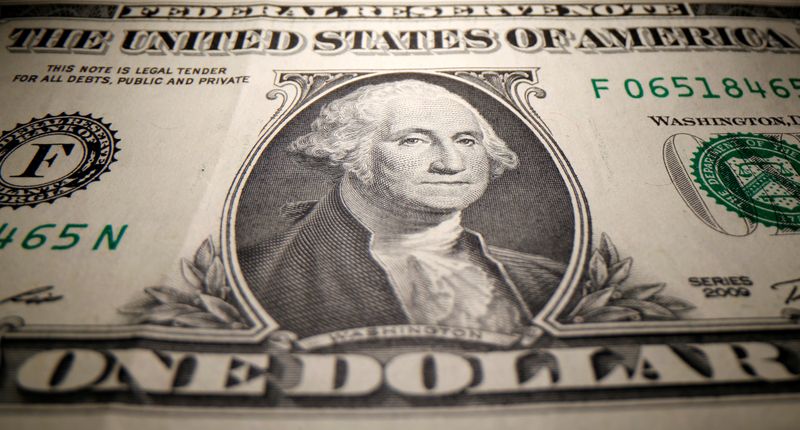By Chuck Mikolajczak
NEW YORK (Reuters) – The U.S. dollar index climbed to a two-week high on Thursday after economic data showed the labor market remained on a solid footing, giving the Federal Reserve a possible cushion to continue raising interest rates.
Weekly initial jobless claims decreased 26,000 to a seasonally adjusted 239,000, the largest drop in 20 months and below the expectation of 265,000 by economists polled by Reuters.
In addition, the Commerce Department revised its first-quarter gross domestic product estimate to 2%, up from the 1.3% reported in May and above the 1.4% previous estimate.
Fed Chair Jerome Powell, at an event held by the Spanish central bank in Madrid on Thursday, indicated the central bank is likely to resume their rate hike path after a pause earlier this month.
“For now, the economy remains resilient in the face of all the tightening we’ve seen, and suggests the Fed and others will have to keep going,” said Huw Roberts, head of analytics at Quant Insight.
On Wednesday, Powell said at a European Central Bank meeting of central bankers he did not see inflation getting back to the Fed’s 2% until at least 2025.
In addition, Atlanta Federal Reserve President Raphael Bostic said on Thursday the Fed will have to increase rates if price growth moves away from target, or inflation expectations start to move in “a difficult way.”
Other central bank heads at the meeting, including ECB President Christine Lagarde and Bank of England Governor Andrew Bailey, also supported more rate hikes, with the exception of Bank of Japan (BOJ) chief Kazuo Ueda.
Earlier data in Europe showed German inflation rose more than expected in June, ending a steady decline since the beginning of the year, while inflation in Spain and Italy eased.
“The latest numbers … point to sticky inflation, at least at the core level if not the headline level, and that was true in Europe too,” said Roberts. “Look at the Spanish core inflation, and German too – that speaks to central banks still being in play.”
Quarter and month-end positioning by investors may also be affecting price action, he added.
The dollar index rose 0.35% at 103.310 after climbing to 103.44, its highest level since June 13.
Market expectations for a 25 basis-point hike by the Fed at its July meeting rose to 86.8% from 81.8% in the prior session, according to CME’s FedWatch Tool, and completely rule out a rate cut this year.
The dollar strengthened against the Japanese yen for a third straight day, hitting a fresh 7-1/2 month high of 144.90, as U.S. and Japanese central bank policy plans are expected to remain at opposite ends of the spectrum.
The yen weakened 0.23% versus the greenback to 144.83 per dollar. Investors are watching to see if the BOJ will intervene in the currency again, which last happened at around the 145 mark.
Sweden’s crown hit a record low of 11.8502 against the euro after the Riksbank modestly raised its policy rate and increased the pace of its bond sales.
The Swedish crown was last down 0.35% at 11.81 per euro.



